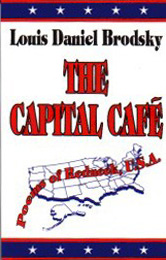

The Capital Café
Poems of Redneck, U.S.A.
Hardback and Paperback: 111 pp.
Published: 1993
Price: $18.95, $12.50
BUY THE BOOK from Amazon.com
The Capital Café is a collection of forty-eight poems, in two sections, set in a bedroom community of St. Louis and in a Missouri farm town. The poems build on each other like chapters in an engrossing novel. The first half is a slice of life observed by Moe Fischer, formerly a high-school English teacher, now a proofreader for the local newspaper, but always an eavesdropper, an oral historian, and a Jew, adrift in a belt of Baptist piety. The second section is a mosaic occurring at the "gas station turned café," related by rural Americans in seed caps and other regulars, such as the local car dealer, the mortician, and the Holsum Bread man, who spends his time winking furtively at the waitress (Reverend Bone's eighteen-year-old daughter).
Brodsky makes the reader understand that Redneck, U.S.A., isn't so much a specific geographic location as it is a state of being that exists in every big city and four-way-stop hamlet across the nation.
Praise:
Louis Daniel Brodsky's poetry has reached new heights in The Capital Café, etching vivid portraits of small town Americans in middle America. . . . Writing with controlled passion, Brodsky has mapped two Missouri towns with a lyrical intensity that transcends language, speech, giving us a holy chant, a song of people trapped in the terrible blindness that afflicts only those who will not see. In Brodsky's deft hands, that chant soars above anger and fury into a brilliant song that will echo in the heart of the reader long after the book is closed.
— Jory Sherman, author of the Spur Award-winning The Medicine Horn
The Capital Café, by Louis Daniel Brodsky, reflects a Jewish sense of alienation, of being a stranger in a strange land, but more than that, it allows the reader to see the truest versions of America. Brodsky's characters lift up the skirts of the Klan and peek underneath. This is a risky book. Beneath the steaming grits and biscuits and gravy, Brodsky reveals startling visions of redneck America that not only exist in Missouri but in every state of this fair nation.
— Adrian C. Louis, author of Among the Dog Eaters
. . . the poems really exist all at once, portraying every nuance of a small community organically and simultaneously. Brodsky's influences are many, from the Greek poets to Swift to Faulkner. But for me, The Capital Café reveals small town life with the same intimacy and moral purpose as Sherwood Anderson.
— Gregory Curtis, former editor of the 1991 National Magazine Award-winning Texas Monthly
BUY THE BOOK from Amazon.com
Dog Daze and Loony Cats
Each 6 a.m., six days a week,
These hounds sever familial intimacies,
Desert sleeping bitches, twitching litters.
Some come to breakfast
Directly from last evening's mistresses,
Those wanton strangers
Whom others of their brotherhood leave by 1 a.m.
In Lapinga Hotel cages
Before first returning home to their neutered solitudes,
While yet others of the pack abandon dreams
To gather at the Capital Café;
They're all phantasms dogging their own shadows,
Each a misbegotten vapor sifting out of night
Into glazed twilight like topiary fog
In the shapes of canine creatures:
Humane Society mongrels, mutts, curs,
Street breeds, hybrids, Heinz 57s,
Even a few best-in-show, blue-ribbon winners
Howling to be let out of Drowsing's kennel,
Admitted into palatial courtyards
Where their fully awakened imaginations
Might cavort with Louie XIV's castoff whores,
Babbitt's sensual, if elusive, fairy-child,
Or Rosie the Riveters waiting at castle gate,
The Capital Café's front doors,
Like its overly solicitous waitresses —
These regulars lifting their verbal legs,
Sullying, yellowing, causing to wilt and die
Every formal garden held sacred
In Lapinga's hundred-and-fifty-year history.
Except for Sundays, they run their territories,
Compelled and as utterly orderly as astral rotations,
Then converge on their tenaciously held fellowship
Of community watchdogs
To bark derisions and obscenities
At winos, junkies, rapists, and mental cases
Released on their own Thorazined recognizance,
Outpatient crazies all,
Who daily cross their hallucinatory London Bridge
Connecting State Hospital #8
With the Lapinga Courthouse Square,
Where they malinger just outside the Capital Café doors —
The town's alley cats, held at bay,
Mewing halfheartedly
At morning's faintly visible polestar and Lorelei moon.